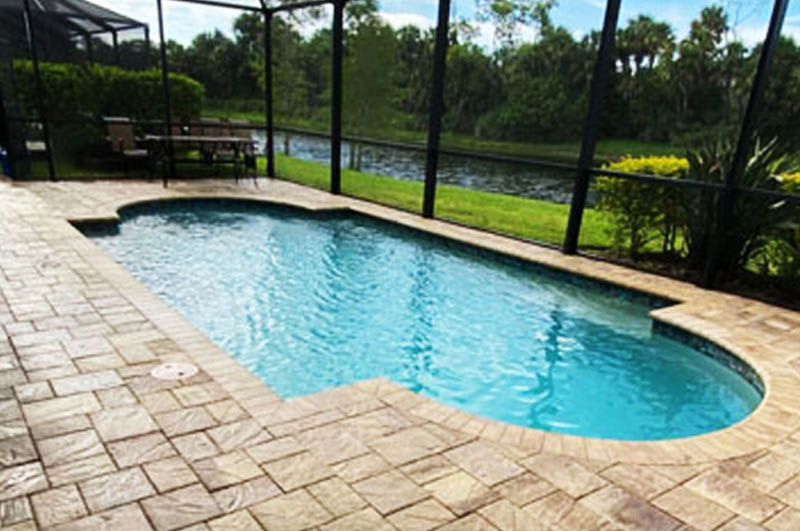Key Considerations for a Paver Pool Deck: What You Need to Know
 A paver pool deck is an excellent choice for enhancing the beauty and functionality of your swimming area.
A paver pool deck is an excellent choice for enhancing the beauty and functionality of your swimming area.
With a range of styles, materials, and design options, paver decks offer a luxurious look while providing durability and low maintenance. However, choosing the right paver and ensuring proper installation requires careful consideration. In this blog post, we’ll cover the essential factors to consider when planning and installing a paver pool deck to ensure it meets your needs and expectations.
1. Material Selection
Types of Pavers
Concrete Pavers: Versatile and cost-effective, concrete pavers come in a variety of colors and patterns. They’re durable but may require sealing to prevent staining and fading.
Travertine Pavers: Known for their natural beauty and heat resistance, travertine pavers stay cool underfoot, making them ideal for pool areas. They’re also slip-resistant but may require regular sealing due to their porous nature.
Natural Stone Pavers: Options like granite, slate, or limestone offer a luxurious and unique appearance. These materials are durable and long-lasting but can be more expensive and require professional installation.
Porcelain Pavers: Durable and low-maintenance, porcelain pavers are resistant to stains and water. They offer a modern look and are ideal for wet areas, though they can be more costly and require precise installation.
Aesthetic Considerations
Choose pavers that complement your home’s architecture and landscape design. Consider color, texture, and pattern to create a cohesive and visually appealing outdoor space. Light-colored pavers can help keep the deck cooler, while darker colors may add a dramatic touch.
2. Slip Resistance
Safety First
A key consideration for any pool deck is slip resistance. Water from the pool can make surfaces slippery, increasing the risk of accidents. Choose pavers with a textured surface or slip-resistant finish to enhance safety. Natural stone and certain types of concrete pavers offer good slip resistance, but always check the manufacturer’s specifications.
Regular Maintenance
Even with slip-resistant pavers, regular maintenance is crucial. Keep the deck clean and free of algae or mildew, which can create slippery conditions. Use a pressure washer or appropriate cleaning solutions to maintain the deck’s safety and appearance.
3. Heat Retention
Comfort Underfoot
Pool decks can become extremely hot under direct sunlight, which can be uncomfortable for bare feet. Light-colored pavers or materials like travertine and porcelain, which are known for their heat resistance, can help keep the deck cooler. Consider the local climate and the orientation of your pool area when selecting paver materials.
Heat-Reflective Finishes
Some pavers come with heat-reflective finishes or coatings that can further reduce heat absorption. These finishes can help maintain a comfortable temperature on the deck and prolong the lifespan of the pavers.
4. Installation and Drainage
Proper Installation
The installation process is crucial for the longevity and performance of your paver pool deck. Ensure that the base is properly prepared and that pavers are installed with the correct joint spacing and leveling. Professional installation is often recommended to avoid issues such as shifting or uneven surfaces.
Effective Drainage
Proper drainage is essential to prevent water pooling and potential damage to the pavers. Ensure that the deck is installed with a slight slope away from the pool to facilitate water runoff. Adequate drainage systems, such as surface drains or perimeter drainage, can also help manage water flow and prevent erosion.
5. Maintenance and Upkeep
Regular Cleaning
Regular cleaning is essential to maintain the appearance and functionality of your paver pool deck. Sweep the deck regularly to remove debris, and wash it periodically to prevent staining and buildup. For tough stains, use appropriate cleaning solutions that are safe for the paver material.
Sealing
Sealing your paver pool deck can enhance its durability and resistance to stains, moisture, and UV damage. Depending on the material, sealing may be required annually or every few years. Follow the manufacturer’s recommendations for the best results.
6. Budget and Costs
Cost Considerations
The cost of a paver pool deck varies depending on the material chosen, the size of the deck, and the complexity of the installation. Natural stone and high-end porcelain pavers tend to be more expensive, while concrete and brick pavers offer more budget-friendly options.
Long-Term Value
While initial costs are an important factor, consider the long-term value of your investment. Durable and low-maintenance pavers may have a higher upfront cost but can provide significant savings over time due to their longevity and reduced maintenance needs.
Conclusion
Selecting the right paver for your pool deck involves balancing aesthetics, safety, durability, and cost. By considering factors such as material type, slip resistance, heat retention, installation, and maintenance, you can create a beautiful and functional outdoor space that enhances your enjoyment of the pool.
At GES Pavers, we specialize in designing and installing high-quality paver pool decks tailored to your specific needs and preferences. Our expert team is dedicated to delivering exceptional results and ensuring your pool area is both stylish and practical. Serving locations including Sarasota, Tampa, Venice, Lakewood Ranch, Anna Maria Island, Apollo Beach, Bradenton, Englewood, Longboat Key, Osprey, Palmetto, Parrish, Siesta Key, and more, we’re your local partner for all your paver needs.
Need expert advice on paver installation?
Contact GES Pavers at 941-867-6793 today to start planning your ideal paver pool deck and enjoy a stunning outdoor space for years to come.

